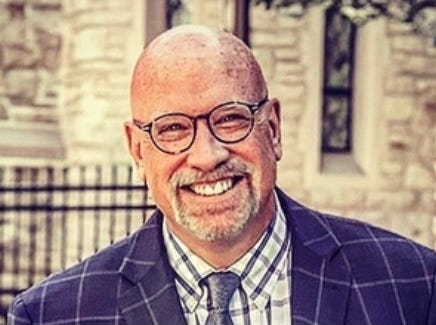Life is Not a Burden, but a Blessing
In a culture obsessed with autonomy and instant gratification, the sanctity of life is routinely discarded in favor of convenience and control. Whether it manifests in abortion, euthanasia, assisted suicide, gender mutilation, or the glorification of violence and self-harm, the modern world has embraced a Culture of Death—one that stands in direct opposition to the Gospel of Life proclaimed by Jesus Christ.
The language of modernity is slick and sanitizing—"choice," "compassionate care," "reproductive rights," "gender affirmation," “freedom” —but underneath the euphemisms lie a harsh reality: we are living through a spiritual and moral collapse.
But we are not called to despair. We are called to respond, with truth and charity. A moral and ethical response to the Culture of Death must not only be policy-driven, but Christ-centered. We must rebuild the Culture of Life not with condemnation, but with conversion. Overall, the origins of the United States as a country focused on the providence of God and the belief in Christian teachings, did it not?
I. A Crisis of Formation: The Need for Moral and Spiritual Maturity
Scripture tells us, "Train up a child in the way he should go, and when he is old he will not depart from it" (Proverbs 22:6). The Culture of Death does not begin in legislative chambers; it begins in the collapse of moral formation. When young men and women are raised without a moral compass, without the stability of family, and without the knowledge of God, they are vulnerable to the lies of the culture.
St. John Chrysostom, a Doctor of the Church, warned that “where virtue is not loved, vice will reign.” Today, we do not merely have a vice problem, but a virtue vacuum.
Formation must begin in the home, be reinforced by the Church, and cultivated through community. We must teach our children that life is sacred from conception to natural death, that suffering has redemptive value, and that every human being is made in the image and likeness of God (Genesis 1:27).
II. The Family: The First Sanctuary of Life
The Catechism of the Catholic Church is clear: "The family is the original cell of social life" (CCC 2207). It is within the family that we first learn love, sacrifice, and the meaning of life. But today, the family is under siege—through divorce, cohabitation, fatherlessness, transgender ideology, and cultural confusion.
When the family is broken or redefined, life becomes negotiable. Children become incidental instead of intentional, and the vulnerable—the elderly, the sick, the mentally ill—become expendable.
St. Augustine wrote, "The family is the first school of love." We must rebuild the family through:
Marriage preparation rooted in sacramental theology
Fatherhood formation in parishes
Intergenerational support for single parents, the one’s with physical and mental suffering, and the elderly
Let us heed Psalm 127:3: "Behold, children are a heritage from the Lord, the fruit of the womb a reward."
III. Faith: The Soul of the Culture of Life
We must never forget that ours is not merely a cultural battle, but a spiritual war. St. Paul reminds us, "We do not wrestle against flesh and blood, but against the spiritual forces of evil" (Ephesians 6:12).
The early Church fathers were unequivocal in their defense of life. Didache, Tertullian and St. Basil the Great all condemned both abortion and euthanasia in their epic writings.
Faith anchors us in truth. The Church must reclaim her prophetic voice, not just in political discourse, but in liturgy, catechesis, and sacramental life:
Priests and pastors must preach on the dignity of life with clarity and compassion
Parishes and churches should offer Masses and Holy Hours for the defense of life
Sacramental reconciliation must be available to those who have participated in or been harmed by the Culture of Death
As Psalm 139:13-14 declares: "You formed my inward parts; you knitted me together in my mother's womb. I praise you, for I am fearfully and wonderfully made."
A Note on Bioethics: A Framework of Life Positivity
As a Christian, practicing Catholic, and a professor deeply rooted in life positive bioethics, I argue that the Culture of Death is not simply a spiritual phenomenon—it is also a distortion of natural law, medical ethics, and the very foundation of human dignity. Bioethics, rightly understood, must uphold life from conception to natural death and must be formed by immutable truths, not evolving ideologies.
Modern bioethics—especially in secular institutions—has been hijacked by utilitarianism, where the value of a life is weighed against perceived "quality" or "productivity." But Christian teaching insists that dignity is intrinsic, not assigned. The moment we begin to assign value based on functionality, we open the door to horrific justifications: abortion for the inconvenient, euthanasia for the elderly, and experimental surgeries on confused minors.
St. Thomas Aquinas taught that "the good is to be done and pursued, and evil is to be avoided." This first principle of practical reason is foundational to bioethics, or it least it should be. Every technological or medical advancement must be examined through the lens of morality, ethics, and objective truth.
This is why the Church rejects abortion, euthanasia, gender reassignment surgeries, embryonic stem cell research, and in vitro fertilization. It is not because the Church is anti-science, it is because the Church is pro-person. Human beings are not commodities to be engineered, destroyed, or customized. They are temples of the Holy Spirit (1 Corinthians 6:19).
Bioethics also demands moral clarity in an age of emotional confusion. We must reject the false compassion of killing to alleviate suffering. True compassion accompanies suffering, offering love, palliative care, and the Cross—not a syringe or a scalpel. As Pope Benedict XVI (16) warned, a civilization that loses sight of God will eventually lose sight of man.
Thus, a truly Christian approach to bioethics must be:
Rooted in natural law and Divine Revelation
Informed by the moral theology of the Church
Centered on the dignity and sanctity of every human person
As Christians, we must engage bioethical debates not only with reason, but with reverence. The battleground of modern medicine is not neutral. It is a moral frontier, where the Gospel of Life must be proclaimed clearly and courageously.
IV. Mercy and Healing: Christ's Love for the Wounded
We must remember that behind every abortion, suicide, or assisted death is a person and victim—often hurting, confused, isolated, or coerced. Christ’s love extends to them, too. The Church must be a hospital for sinners, not a courthouse for the condemned.
Pope St. John Paul II, in Evangelium Vitae, addressed post-abortive women and all those wounded by the Culture of Death with these words:
"The Father of mercies is ready to give you His forgiveness and His peace in the Sacrament of Reconciliation. To the same Father and His mercy, you can with sure hope entrust your child."
Rachel's Vineyard, Project Rachel, ministries for the elderly, suicide prevention programs, and outreach to those suffering from gender dysphoria must all be supported and promoted in every diocese.
As Proverbs 24:11 urges: "Rescue those being led away to death; hold back those staggering toward slaughter."
V. Practical Action Rooted in Catholic Teaching
As faithful citizens, we must support laws that uphold the dignity of the human person from conception to natural death. But these laws must be rooted in Christian social teaching, which balances the sacredness of life with the common good.
Christian Life-Affirming Priorities:
Love at all costs, always.
People who have suffered through these issues are victims, not criminals.
People and organizations who prey on those suffering need our prayers but also need our action in condemnation for such activities.
Reembrace family, faith, and formation in your own life and your families.
Celebrate a culture of life.
Conclusion: Let Us Be a People of Life
As Christians, we do not fight against people, but for them. We fight for the mother in crisis. We fight for the confused teenager. We fight for the terminally ill elderly person who fears being a burden. We fight for the unborn child who cannot yet speak.
Let us echo the words of Deuteronomy 30:19:
"I have set before you life and death, blessing and curse. Therefore, choose life, that you and your offspring may live."
In this age of death, let us become apostles of life. Not with hatred, but with holiness. Not with slogans, but with Scripture. Not with despair, but with divine mercy.
The battle for life will not be won in courtrooms or Congress alone. It will be won in the confessional, at the altar, in the family meal, and in the loving witness of men and women who know that Christ’s victory on the Cross includes every human being—born or unborn, healthy, or dying, male or female.
Let us, then, be faithful. Let us be fearless. Let us build a culture of life.
Welcome to the St Michael’s Group! In a world facing a decline in religious belief and an increase in moral confusion, the need to reignite our faith has never been more critical. Religion’s capacity to offer meaning, foster ethical behavior, and build cohesive communities is vital for countering the spread of spiritual apathy and the influence of evil. By renewing our commitment to faith, we can combat the forces that seek to divide and weaken us. Reigniting our faith lives, therefore, is not just a personal endeavor but a collective responsibility. It is essential for preserving the moral and spiritual fabric of our society, ensuring that love, compassion, and justice continue to be the guiding principles of human existence.
This is why I started the St. Michael’s Group Substack and Podcast. Join us today stmichaelsgroup.substack.com and let’s start a movement of reigniting faith, family, and formation back into our lives.
This is Dr. Currie Myers. I am an applied criminologist and criminal justice ethicist. I have been on faculty in the criminology department at Benedictine College for over 13 years and was a career law enforcement officer for 24 years. Most importantly I have a beautiful family. My wife and I have been married for 37 years, and we have five children and 10 grandchildren. You can view my work on applied criminology at drcurriemyers.substack.com. Have a great and blessed week and please subscribe and share this podcast with others. And more importantly, if you are struggling in life and need someone to talk to, we have a chat function that you can contact me directly.
If this episode moved you, I invite you to share it with someone you love. Let this be a holy conversation starter. And if you haven’t already, spend time in front of the Cross this weekend. Not to look at it, but to be changed by it.
Thanks for joining me! Stay rooted in faith, sharpened by virtue, and courageous in truth. God bless you, and I’ll see you next time on The St. Michael’s Group Podcast.
Dr Currie Myers, America's Criminologist - Former Agonistic turned Convert to the Catholic Faith. Dr. Myers is a published author and speaker. Contact (catholicspeakers.com) for Dr. Myers to speak at your event!
















Share this post